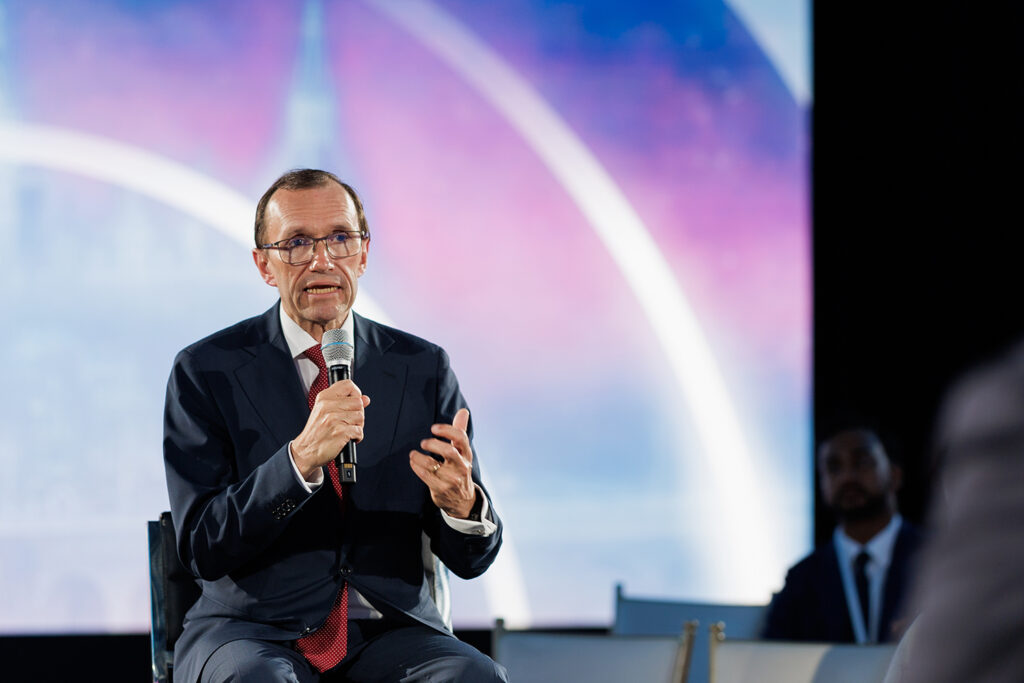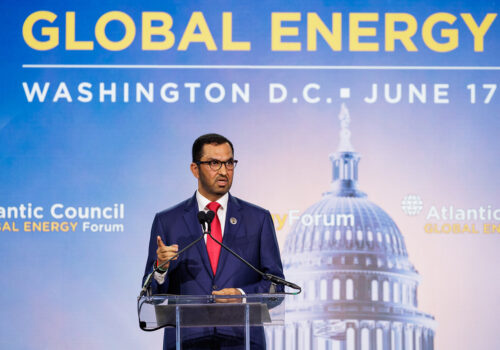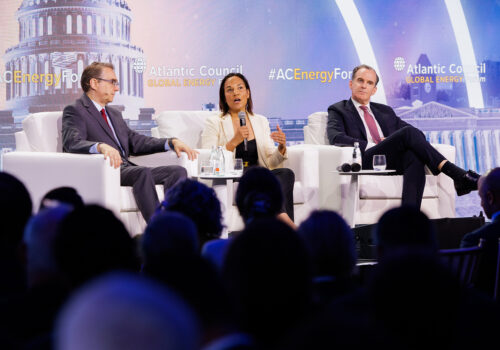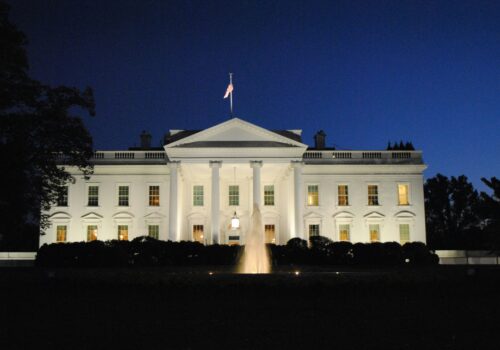Watch the full Global Energy Forum
On Tuesday, the European Commission unveiled a plan to entirely stop its use of Russian oil and gas. For Espen Barth Eide, the foreign minister of Norway (which neighbors the European Union and is the bloc’s top gas supplier), the plan marks a “significant change.”
At the first day of the 2025 Global Energy Forum, hosted by the Atlantic Council’s Global Energy Center, Barth Eide said that the plan is good for “security policy,” “strategic autonomy,” and the “climate transition.”
“By investing in renewables,” while diversifying from Russian oil and gas, “you are both cleaning up your energy system, but at the same time, you are also providing more energy independence from powers like Russia,” he explained.
The plan, which would still need to be passed by the European Parliament, is one example of the “changing geopolitics of energy in Europe,” Barth Eide said. “The geopolitics of energy is important for foreign ministers . . . because it is so central to power dynamics.”
“Everything is connected,” he added. “The degree to which you can create energy independence is so much related to security policy.”
Below are more highlights from the conversation, moderated by Atlantic Council President and Chief Executive Officer Frederick Kempe, which also touched upon the upcoming NATO Summit, Norway’s relationship with the United States, and support for Ukraine.
True independence takes energy independence
- “The most daunting challenge is to make sure that Ukraine emerges from what’s happening now as a free, independent, sovereign nation that can make its own choices. And that is also about energy independence,” Barth Eide said.
- He noted that Oslo has supported Kyiv with funding for gas purchases as well as help building a more resilient energy system. “Ukraine needs missiles and drones and weapons technology, but they also need to keep the economy alive, and that can only be done with a reasonable access to energy,” he noted.
- Barth Eide said he thinks Russian President Vladimir Putin needs to be squeezed harder by European allies—as Norway works with its neighbors on controlling Russia’s sanctions-busting “shadow fleet”—and that he would “welcome stronger sanctions also from the US side.”
- Barth Eide said that Europe understands it should do more to support Ukraine; “but it’s paramount that the US is still in, even if there’s sort of a burden shifting,” he said.
Divide and conquer
- Ahead of next week’s NATO Summit, Barth Eide said that he believes allies are “moving towards consensus” on a new spending goal of 5 percent of gross domestic product on defense—with 3.5 percent focused on traditional defense spending and 1.5 percent earmarked for defense-related spending such as ports and airports. “The majority of NATO is moving there, and I think with the good spirit of the meeting, it will happen,” he said.
- Reflecting on US President Donald Trump’s demands for Europe to spend more on defense, Barth Eide said “Europe should pay more for its own defense and invest more in its own defense,” in part because doing so means that the United States can spend more of “its mental bandwidth” on the Indo-Pacific.
- A US pivot could still redound to Europe’s benefit. Russia turning to North Korean troops or Iranian drones for help in Ukraine, Barth Eide explained, shows that “any idea that you can separate” these theaters “is simply wrong.”
- “I always appreciate when the Atlantic Ocean is narrow in a political sense,” the foreign minister said. “And if we move away from each other, we have to try to get back to where we were.”
Wishing for Washington
- The foreign minister, who was scheduled to visit US Secretary of State Marco Rubio on Wednesday, said that Norway’s partnership with the United States is “very strong” and has not deteriorated with the current US administration. “There are decisions being made here on global issues that I do not always agree with, I don’t think I’m alone in that. But our partnership is strong and growing.”
- Barth Eide pointed to US and Norwegian cooperation on fulfilling Europe’s gas demand. “I think there is a rather deep alignment because we have a shared interest in assisting our allies and friends in Europe in not returning to that dependency on Russia,” he said.
- He added that Norway is “very much eager” to “see more cooperation” on carbon capture and storage, in addition to rare earths and critical minerals, which are important inputs for green technologies. “We need to invest now in how we make sure that some of these sources are controlled by Western friends and allies,” he argued.
Katherine Golden is an associate director on the Atlantic Council’s editorial team.
Watch the full event
Further reading
Tue, Jun 17, 2025
UAE Minister Sultan Al Jaber on how to solve AI’s energy conundrum
New Atlanticist By Katherine Golden
Meeting the demand for energy associated with AI "is not just a technical challenge,” but a “once-in-a-generation" opportunity, Al Jaber said at the 2025 Global Energy Forum.
Tue, Jun 17, 2025
What comes next in the Iran-Israel war, from a US response to energy impacts
New Atlanticist By Katherine Golden
RBC Capital Markets' Helima Croft and the Atlantic Council's Brett McGurk discussed the energy and security risks resulting from the Iran-Israel war.
Mon, Jun 16, 2025
US global leadership in the age of electricity
EnergySource By Robert F. Ichord, Jr.
Amid shifting geopolitics and the emerging "age of electricity," the United States has an opportunity to assert global leadership in energy and security. Through foreign policy, the Trump administration can leverage US strengths in natural gas, nuclear power, and emerging energy technologies to engage allies in building a secure and resilient global electricity system.
Image: Norwegian Foreign Minister Espen Barth Eide speaks at the Atlantic Council's Global Energy Forum on June 17, 2025 in Washington, DC.



